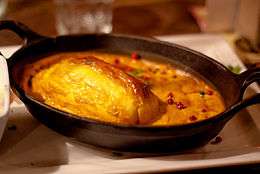Quenelle

A quenelle (French pronunciation: [kə.nɛl]) is a small or moderate quantity of a mixture of creamed fish or meat, sometimes combined with breadcrumbs, with a light egg binding, usually formed into an egg-like shape, and then cooked.[1] The usual preparation is by poaching. Formerly, quenelles were often used as a garnish in haute cuisine. Today, they are more commonly served as a dish in their own right.
It can also be served vegetarian, or "nature".
Similar items are found in many cuisines.
Quenelle may also refer to other food items made into an oval or egg shape, such as ice cream, sorbet, or mashed potato quenelles. This extension of the meaning of the word derives from the similarity in shape with the original fish-or-meat quenelle.
Etymology
The word quenelle is attested from 1750. The commonly accepted etymology is that it derives from the German Knödel (noodle or dumpling).[2]
Quenelles de brochet
Lyon and Nantua are famous for their quenelles de brochet (pike quenelles), often served with sauce mousseline (cream sauce) and run under a broiler.
There are many ways to prepare quenelles de brochet, but most recipes first prepare a panade, essentially a white sauce, then combine the panade with fish, and put the mixture through a sieve such as a tamis, yielding a forcemeat. The quenelles are shaped from the forcemeat and then poached. They may be served sauced and grilled, or with a variety of sauces.[3] Pike has many small bones, and passing it through a tamis is an expedient way of removing them.
See also
References
- ↑ Larousse Gastronomique, 1961
- ↑ Dictionnaire général pour la maîtrise de la langue française, la culture classique et contemporaine. Larousse. 1993. p. 1297. ISBN 2-03-320300-X.; Petit Robert, 1972; Oxford English Dictionary, Draft Revision, Dec. 2007; the old Larousse Gastronomique, however, reports that some writers trace it to an Old English word knyll, while Dietrich Behrens in "Über deutsches Sprachgut im Französischen", Giessener Beiträge zur romanischen Philologie Vol. 1 (1923), proffers dialectical German Knollen or Knöllen, meaning "ball", as a possible origin.
- ↑ Ann Pringle Harries, "Fare of the Country: Delicate Pike Quenelles, a Lyons Tradition", New York Times, August 4, 1991